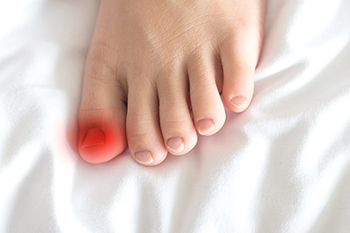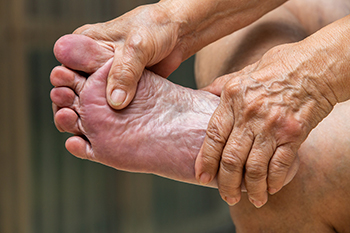Blog
Items filtered by date: May 2025
Ingrown Toenails Can Cause Big Pain

Ingrown toenails occur when the edge of the nail grows into the surrounding skin, most commonly on the big toe. This condition can be caused by improper nail trimming, wearing tight shoes, injury, or a genetic tendency for curved nails. Symptoms include redness, swelling, tenderness, and pain along the nail edge. In more severe cases, the area may become infected, leading to pus, warmth, and increased discomfort. Walking or wearing shoes can become painful, especially if the condition worsens. A podiatrist can effectively treat ingrown toenails by carefully removing the ingrown portion and relieving pressure. For recurring cases, a minor in-office procedure may be done to permanently remove part of the nail and prevent future problems. They may also provide guidance on proper nail care, footwear, and hygiene to reduce the risk of recurrence. If you have a painful ingrown toenail, it is suggested that you schedule an appointment with a podiatrist for effective treatment.
Ingrown toenails can become painful if they are not treated properly. For more information about ingrown toenails, contact one of our podiatrists of South Jersey Foot & Ankle Institute. Our doctors can provide the care you need to keep you pain-free and on your feet.
Ingrown Toenails
Ingrown toenails occur when a toenail grows sideways into the bed of the nail, causing pain, swelling, and possibly infection.
Causes
- Bacterial infections
- Improper nail cutting such as cutting it too short or not straight across
- Trauma to the toe, such as stubbing, which causes the nail to grow back irregularly
- Ill-fitting shoes that bunch the toes too close together
- Genetic predisposition
Prevention
Wearing proper fitting shoes and using proper cutting techniques will also help decrease your risk of developing ingrown toenails.
Treatment
Ingrown toenails are a very treatable foot condition. In minor cases, soaking the affected area in salt or antibacterial soaps will not only help with the ingrown nail itself, but also help prevent any infections from occurring. In more severe cases, surgery is an option. In either case, speaking to your podiatrist about this condition will help you get a better understanding of specific treatment options that are right for you.
If you have any questions, please feel free to contact our office located in Mullica Hill, NJ . We offer the newest diagnostic and treatment technologies for all your foot care needs.
Common Foot Problems That Affect Older Adults

As people age, they often experience a variety of foot problems that can affect mobility and comfort. Bunions are a common issue, where the joint at the base of the big toe becomes enlarged and misaligned, causing pain and difficulty with footwear. Hammertoes develop when one or more toes become bent at the middle joint, often leading to discomfort and pressure in shoes. Corns, which are thickened areas of skin caused by repeated friction, can also become painful and make walking difficult. Older adults may be more susceptible to athlete’s foot, a fungal infection that causes itching and burning between the toes. Toenail fungus is another frequent concern, leading to thickened, discolored nails that are difficult to manage. If you are elderly and have developed foot pain, it is suggested that you schedule routine visits to a podiatrist who can treat various foot conditions and help you to monitor your foot health.
Proper foot care is something many older adults forget to consider. If you have any concerns about your feet and ankles, contact one of our podiatrists from South Jersey Foot & Ankle Institute. Our doctors can provide the care you need to keep you pain-free and on your feet.
The Elderly and Their Feet
As we age we start to notice many changes in our body, but the elder population may not notice them right away. Medical conditions may prevent the elderly to take notice of their foot health right away. Poor vision is a lead contributor to not taking action for the elderly.
Common Conditions
- Neuropathy – can reduce feeling in the feet and can hide many life-threatening medical conditions.
- Reduced flexibility – prevents the ability of proper toenail trimming, and foot cleaning. If left untreated, it may lead to further medical issues.
- Foot sores – amongst the older population can be serious before they are discovered. Some of the problematic conditions they may face are:
- Gouging toenails affecting nearby toe
- Shoes that don’t fit properly
- Pressure sores
- Loss of circulation in legs & feet
- Edema & swelling of feet and ankles
Susceptible Infections
Diabetes and poor circulation can cause general loss of sensitivity over the years, turning a simple cut into a serious issue.
If you have any questions, please feel free to contact our office located in Mullica Hill, NJ . We offer the newest diagnostic and treatment technologies for all your foot care needs.
Falls Prevention Tips For Older Folks

Preventing falls is essential for older adults to maintain independence and avoid injury. One of the most effective ways to stay safe is by keeping the body strong and balanced through regular movement such as walking or gentle stretching. Keeping living spaces clear of clutter and ensuring floors are dry and well lit can reduce the chance of tripping. Supportive footwear that fits properly provides stability and reduces slipping. Installing grab bars in bathrooms and using handrails on stairs adds extra safety. Regular vision checks and reviewing medications can help identify issues that may affect balance or alertness. Falling can seriously impact the feet. If you have fallen and have injured your foot or ankle, it is suggested that you consult a podiatrist who can treat various foot conditions, and guide you on additional falls prevention tips.
Preventing falls among the elderly is very important. If you are older and have fallen or fear that you are prone to falling, consult with one of our podiatrists from South Jersey Foot & Ankle Institute. Our doctors will assess your condition and provide you with quality advice and care.
Every 11 seconds, an elderly American is being treated in an emergency room for a fall related injury. Falls are the leading cause of head and hip injuries for those 65 and older. Due to decreases in strength, balance, senses, and lack of awareness, elderly persons are very susceptible to falling. Thankfully, there are a number of things older persons can do to prevent falls.
How to Prevent Falls
Some effective methods that older persons can do to prevent falls include:
- Enrolling in strength and balance exercise program to increase balance and strength
- Periodically having your sight and hearing checked
- Discuss any medications you have with a doctor to see if it increases the risk of falling
- Clearing the house of falling hazards and installing devices like grab bars and railings
- Utilizing a walker or cane
- Wearing shoes that provide good support and cushioning
- Talking to family members about falling and increasing awareness
Falling can be a traumatic and embarrassing experience for elderly persons; this can make them less willing to leave the house, and less willing to talk to someone about their fears of falling. Doing such things, however, will increase the likelihood of tripping or losing one’s balance. Knowing the causes of falling and how to prevent them is the best way to mitigate the risk of serious injury.
If you have any questions, please feel free to contact our office located in Mullica Hill, NJ . We offer the newest diagnostic and treatment technologies for all your foot care needs.

